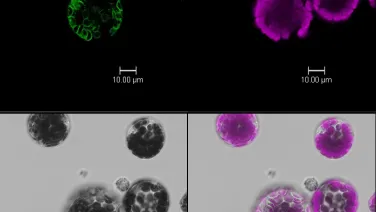PS Seminar Series: Single Cell Analysis of Mother Earth
A fundamental challenge in biology is dealing with high levels of heterogeneity, from genes in genomes, to developing tissues in an organism, to grass and trees in woodland biomes.
Speakers
Event series
Content navigation
Description

Abstract: A fundamental challenge in biology is dealing with high levels of heterogeneity, from genes in genomes, to developing tissues in an organism, to grass and trees in woodland biomes. Recently, bottom up approaches of genome assembly and single cell analysis have led to breakthroughs in health diagnostics, identifying early indicators of disease and novel cell types, states and functions. Our bodies have trillions of cells across millions of tissues, expressing thousands of genes, a truly genomical scale. At the macroscopic level, satellites are scanning 10 trillion land pixels, weekly, in dozens of colors. They signal healthy green, flowering, senescent and/or bare land cell states that describe crops, pastures and trees that provide food, fibre and fertility of mother earth. These land cells respond to (farm) management and local environmental inputs. They grow and develop and cycle water and carbon as outputs according to their genetic program. I will present our progress mapping and modelling crop, pasture and tree cells and their functions, which has the potential to transform our global accounting for environmental and planetary health. Our aim is to guide better land management under ever more challenging future conditions.
I dedicate this talk to my past phd advisor who took on scaling Arabidopsis research to global climate solutions particularly carbon removal in agriculture.
Biography: Justin Borevitz did his phd and postdoc at the Salk institute under Joanne Chory and Joe Ecker 1997-2004, was assistant and associate professor at UChicago (2004-2011) and then moved to ANU. He has studied the genetic basis of climate adaptation in model organisms, emerging crops and ecological foundation species. His work spans genes to ecosystems focusing on genomic and phenomic tools to scale from DNA to the biosphere, including linking genes underlying growth and developmental traits to ecosystem services of food and fertility.

